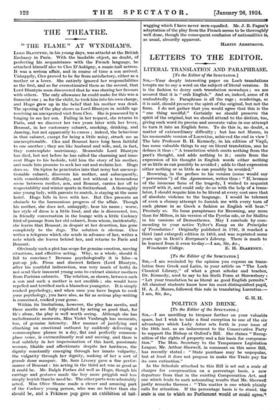LETTERS TO THE EDITOR.
LITERAL TRANSLATION AND PARAPHRASE. [To the Editor of the SPECTATOR.]
SIR,—Your deeply interesting paper on Loeb translations tempts me to say a word on the subject of literal- versions. -It is the fashion to decry such translation nowadays ; we are assured that it is " crib English." And so, indeed, some of it undoubtedly is. Paraphrase is all the rage ; renderings, scr it is said, should preserve the spirit of the original, but not the form. I do not gather that you would agree that this is the " one thing needful." Certainly we should preserve the spirit of the original, but we should attend to the diction, too, giving each word its precise and accurate value in our attempt to turn it into an English form. To do this is, no doubt, a matter of extraordinary difficulty ; but has not Munro, in his memorable version of Lucretius, achieved the end in view f The late Professor B. H. Kennedy, in his edition of Virgil, has some valuable things to say on literal translation, and he defines it thus : " A translation which omits nothing from the poet's thought, and adds nothing to it ; omits from the expression of his thought in English words either nothing or as little as can possibly be avoided ; adds to that expression either nothing or as little as can possibly be avoided."
Browning, in the preface to his version (some would say " perversion ") of the .Agamemnon, writes thus : " If, because of the immense fame of the tragedy, I wished to acquaint myself with it, and could only do-so with the help of a trans- lator, I should require him to be literal at every cost save that of absolute violence to the language. I would be tolerant of even a clumsy attempt to furnish me with every turn of each phrase in as Greek a fashion as English will bear." Precisely so. No loose paraphrases for Browning, any more than for Milton, in his version of the Pyrrha ode, or for Shillito in his versions of Demosthenes. May I conclude by com- mending to your notice Tylter's Essay on the Principles of Translation ? Originally published in 1791, it reached a third (and enlarged) edition in 1813, and was reprinted some years ago in Dent's Everyman's Library. There is much to be learned from it even to-day.—I am, Sir, &c.,


































 Previous page
Previous page